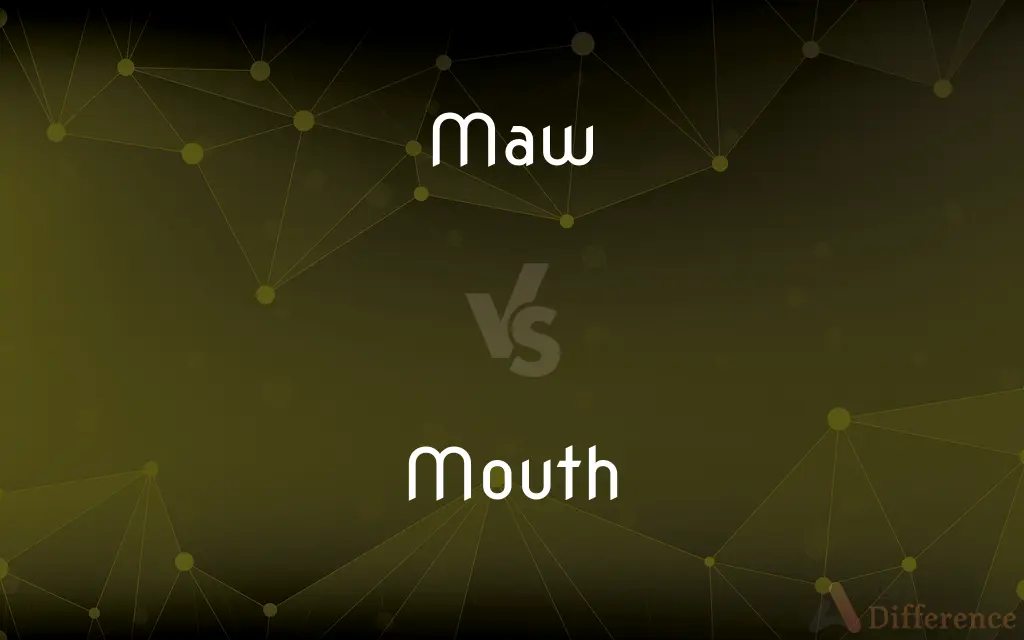Maw vs. Mouth — What's the Difference?
By Fiza Rafique & Maham Liaqat — Updated on April 1, 2024
Maw refers to the jaws or throat of a voracious animal; mouth is a broader term, including human oral cavities used for eating and speaking.

Difference Between Maw and Mouth
Table of Contents
ADVERTISEMENT
Key Differences
Maw specifically denotes the jaws or throat of a voracious animal, emphasizing aspects of ferocity and consumption, often used in a more poetic or dramatic context to describe the gaping jaws of predators. The mouth, however, refers to the oral cavity in humans or animals, serving primary functions such as eating, breathing, and vocalization. It's a universal term applicable across biological species, highlighting its role in various physiological and communicative processes.
While the maw is often associated with imagery of devouring or danger, invoking a sense of awe or fear, the mouth is considered from a more functional and everyday perspective. The mouth is essential for speech in humans, a key aspect of communication and expression, contrasting with the maw's more primitive, survival-oriented connotation.
In literature and storytelling, the maw is frequently used to enhance descriptions of monsters or fearsome beasts, enriching narratives with a sense of peril or the unknown. The mouth, conversely, is featured in discussions about health, beauty, and expression, reflecting its multifaceted roles in human life beyond just the consumption of food.
The term maw can sometimes be employed metaphorically to describe entities that consume or engulf, such as "the maw of the ocean." In contrast, the mouth is often discussed in practical, everyday contexts, including oral hygiene, culinary enjoyment, and articulation, showcasing the divergence in the application and symbolism of the two terms.
Despite these differences, both the maw and the mouth are central to the life processes of animals and humans, playing crucial roles in nutrition, perception, and interaction with the environment. This common ground underscores the biological significance of these structures, even as their conceptual associations and uses in language diverge.
ADVERTISEMENT
Comparison Chart
Definition
Jaws or throat of a voracious animal
Oral cavity in humans or animals
Connotation
Often implies ferocity or danger
Broadly used, associated with function and communication
Usage in Language
Poetic, dramatic, sometimes metaphorical
Everyday, functional, health-oriented
Role in Literature
Describes beasts or dangers
Involved in expression, health, and culinary contexts
Symbolism
Devouring, consuming
Speaking, eating, breathing
Compare with Definitions
Maw
Used metaphorically to describe things that consume.
He was swallowed into the maw of despair.
Mouth
The opening in the face used for eating, speaking, and breathing.
She covered her mouth in surprise.
Maw
The jaws or throat of a voracious animal, often large or frightening.
The lion opened its maw wide to roar.
Mouth
Subject of health and hygiene.
Regular visits to the dentist are important for keeping your mouth healthy.
Maw
Can imply danger or voraciousness.
The explorers avoided the cave, fearing the maw of the beast within.
Mouth
Involved in expression and communication.
His mouth moved quickly as he explained the complex idea.
Maw
Sometimes denotes a gaping opening.
The maw of the cave was dark and unwelcoming.
Mouth
Used in culinary contexts.
The chef prepared a dish that was a delight to the mouth.
Maw
Rarely applies to humans, emphasizing the animalistic or monstrous.
Tales of sea monsters describe their gaping maws.
Mouth
Applies to both humans and animals.
The veterinarian checked the horse's mouth for any signs of disease.
Maw
The mouth, stomach, jaws, or gullet of a voracious animal, especially a carnivore.
Mouth
In animal anatomy, the mouth, also known as the oral cavity, buccal cavity, or in Latin cavum oris, is the opening through which many animals take in food and issue vocal sounds. It is also the cavity lying at the upper end of the alimentary canal, bounded on the outside by the lips and inside by the pharynx and containing in higher vertebrates the tongue and teeth.
Maw
The opening into something felt to be insatiable
"I saw the opening maw of hell" (Herman Melville).
Mouth
The body opening through which an animal takes in food.
Maw
(archaic) The stomach, especially of an animal.
Mouth
The cavity lying at the upper end of the digestive tract, bounded on the outside by the lips and inside by the oropharynx and containing in humans and certain other vertebrates the tongue, gums, and teeth.
Maw
The upper digestive tract (where food enters the body), especially the mouth and jaws of a fearsome and ravenous creature.
Mouth
This cavity regarded as the source of sounds and speech.
Maw
The mouth.
Shut your maw!
Mouth
The opening to any cavity or canal in an organ or a bodily part.
Maw
Any large, insatiable or perilous opening.
Mouth
The part of the lips visible on the human face.
Maw
Appetite; inclination.
Mouth
A pout, grimace, or similar expression:made a mouth when the teacher turned away.
Maw
Mother.
Mouth
A person viewed as a consumer of food:has three mouths to feed at home.
Maw
A gull.
Mouth
A spokesperson; a mouthpiece:acts as the mouth of the organization.
Maw
A gull.
Mouth
Utterance; voice:gave mouth to her doubts.
Maw
A stomach; the receptacle into which food is taken by swallowing; in birds, the craw; - now used only of the lower animals, exept humorously or in contempt.
Bellies and maws of living creatures.
Mouth
A tendency to talk excessively or unwisely:is known mainly for his mouth.
Maw
Appetite; inclination.
Unless you had more maw to do me good.
Mouth
Impudent or vulgar talk:Watch your mouth.
Maw
An old game at cards.
Mouth
The part of a stream or river that empties into a larger body of water.
Maw
Informal terms for the mouth
Mouth
The entrance to a harbor, canyon, valley, or cave.
Mouth
The opening through which a container is filled or emptied.
Mouth
The opening between the jaws of a vise or other holding or gripping tool.
Mouth
An opening in the pipe of an organ.
Mouth
The opening in the mouthpiece of a flute across which the player blows.
Mouth
To declare in a pompous manner; declaim:mouthing his opinions of the candidates.
Mouth
To utter without conviction or understanding:mouthing empty compliments.
Mouth
To form soundlessly:I mouthed the words as the others sang.
Mouth
To take in or touch with the mouth:Small children tend to mouth their toys.
Mouth
To orate affectedly; declaim.
Mouth
To grimace.
Mouth
(anatomy) The opening of a creature through which food is ingested.
"Open your mouth and say 'aah'," directed the doctor.
Mouth
The end of a river out of which water flows into a sea or other large body of water.
The mouth of the river is a good place to go birdwatching in spring and autumn.
Mouth
An outlet, aperture or orifice.
The mouth of a cave
Mouth
(slang) A loud or overly talkative person.
My kid sister is a real mouth; she never shuts up.
Mouth
(saddlery) The crosspiece of a bridle bit, which enters the mouth of an animal.
Mouth
(obsolete) A principal speaker; one who utters the common opinion; a mouthpiece.
Mouth
(obsolete) Speech; language; testimony.
Mouth
(obsolete) A wry face; a grimace; a mow.
Mouth
(transitive) To speak; to utter.
He mouthed his opinions on the subject at the meeting.
Mouth
(transitive) To make the actions of speech, without producing sound.
The prompter mouthed the words to the actor, who had forgotten them.
Mouth
To form with the mouth.
Mouth
(ambitransitive) To utter with a voice that is overly loud or swelling.
Mouth
To exit at a mouth (such as a river mouth)
Mouth
(transitive) To pick up or handle with the lips or mouth, but not chew or swallow.
The fish mouthed the lure, but didn't bite.
Mouth
To take into the mouth; to seize or grind with the mouth or teeth; to chew; to devour.
Mouth
To form or cleanse with the mouth; to lick, as a bear licks her cub.
Mouth
To carry in the mouth.
Mouth
(obsolete) To make mouths at
Mouth
To form a mouth or opening in.
Mouth
(sheep husbandry) To examine the teeth of.
Mouth
The opening through which an animal receives food; the aperture between the jaws or between the lips; also, the cavity, containing the tongue and teeth, between the lips and the pharynx; the buccal cavity.
Mouth
An opening affording entrance or exit; orifice; aperture;
Mouth
The crosspiece of a bridle bit, which enters the mouth of an animal.
Mouth
A principal speaker; one who utters the common opinion; a mouthpiece.
Every coffeehouse has some particular statesman belonging to it, who is the mouth of the street where he lives.
Mouth
Cry; voice.
Mouth
Speech; language; testimony.
That in the mouth of two or three witnesses every word may be established.
Mouth
A wry face; a grimace; a mow.
Counterfeit sad looks,Make mouths upon me when I turn my back.
The mouth of them that speak lies shall be stopped.
Whose mouths must be stopped.
Mouth
To take into the mouth; to seize or grind with the mouth or teeth; to chew; to devour.
Mouth
To utter with a voice affectedly big or swelling; to speak in a strained or unnaturally sonorous manner; as, mouthing platitudes.
Mouthing out his hollow oes and aes.
Mouth
To form or cleanse with the mouth; to lick, as a bear her cub.
Mouth
To make mouths at.
Mouth
To speak with a full, round, or loud, affected voice; to vociferate; to rant.
I'll bellow out for Rome, and for my country,And mouth at Cæsar, till I shake the senate.
Mouth
To put mouth to mouth; to kiss.
Mouth
To make grimaces, esp. in ridicule or contempt.
Well I know, when I am gone,How she mouths behind my back.
Mouth
The opening through which food is taken in and vocalizations emerge;
He stuffed his mouth with candy
Mouth
The externally visible part of the oral cavity on the face and the system of organs surrounding the opening;
She wiped lipstick from her mouth
Mouth
An opening that resembles a mouth (as of a cave or a gorge);
He rode into the mouth of the canyon
They built a fire at the mouth of the cave
Mouth
The point where a stream issues into a larger body of water;
New York is at the mouth of the Hudson
Mouth
A person conceived as a consumer of food;
He has four mouths to feed
Mouth
A spokesperson (as a lawyer)
Mouth
An impudent or insolent rejoinder;
Don't give me any of your sass
Mouth
The opening of a jar or bottle;
The jar had a wide mouth
Mouth
Express in speech;
She talks a lot of nonsense
This depressed patient does not verbalize
Mouth
Articulate silently; form words with the lips only;
She mouthed a swear word
Mouth
Touch with the mouth
Common Curiosities
What animals typically have a "maw"?
Predatory animals or those with notably large or ferocious jaws, like sharks, lions, or mythical beasts.
How is "maw" used metaphorically?
It can describe entities or situations that engulf or consume, often with a negative connotation, like "the maw of the sea."
Can "maw" and "mouth" be used interchangeably?
While they can overlap in referring to oral cavities, "maw" has specific connotations of ferocity and is less common in everyday language.
Why is the mouth important for humans?
It plays a critical role in eating, breathing, speaking, and expressing emotions.
Is oral hygiene only relevant for the mouth?
Yes, oral hygiene typically refers to the care of the human mouth, including teeth and gums.
What makes the mouth a subject of health discussions?
Its importance in nutrition, respiratory health, and vulnerability to various diseases makes it a focus of health and hygiene.
How do cultural perceptions of the mouth vary?
Cultural perceptions can influence practices related to oral hygiene, culinary traditions, and expressions of emotion.
What literary devices are enhanced by the use of "maw"?
Imagery, metaphor, and tone can be enhanced by "maw" to evoke fear, danger, or the unknown.
Can the term "maw" apply to non-animal entities?
Yes, it can be used metaphorically to describe things that engulf or consume, such as machines or natural phenomena.
Does the maw have a role in human anatomy?
The term "maw" is not typically used in a formal anatomical context for humans; it is more commonly applied to animals or metaphorically.
How do functional differences between the maw and mouth affect their usage in language?
"Maw" emphasizes consumption and danger, suited for dramatic or poetic contexts, while "mouth" has broader, more functional applications in everyday language and health.
Is the mouth considered in non-verbal communication?
Yes, movements and expressions of the mouth are key components of non-verbal communication.
How does the concept of "maw" influence storytelling?
It adds dramatic flair and can symbolize danger, challenges, or the character of a creature or situation.
Can "maw" have a positive connotation?
It's less common, as "maw" typically conveys voracity or danger, but it can be used positively in creative contexts to denote abundance or richness.
What role does the mouth play in sensory experiences?
It's central to the senses of taste and texture, affecting culinary enjoyment and perception of food.
Share Your Discovery

Previous Comparison
Join vs. Connect
Next Comparison
Motte vs. MottoAuthor Spotlight
Written by
Fiza RafiqueFiza Rafique is a skilled content writer at AskDifference.com, where she meticulously refines and enhances written pieces. Drawing from her vast editorial expertise, Fiza ensures clarity, accuracy, and precision in every article. Passionate about language, she continually seeks to elevate the quality of content for readers worldwide.
Co-written by
Maham Liaqat














































